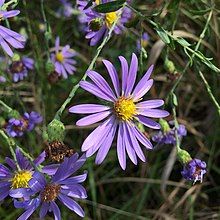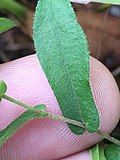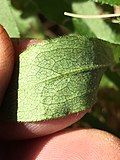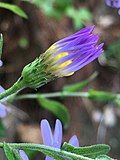Symphyotrichum patens
| Symphyotrichum patens | |
|---|---|

| |
| In Polkton, North Carolina | |
| Scientific classification | |
| Kingdom: | Plantae |
| Clade: | Tracheophytes |
| Clade: | Angiosperms |
| Clade: | Eudicots |
| Clade: | Asterids |
| Order: | Asterales |
| Family: | Asteraceae |
| Tribe: | Astereae |
| Subtribe: | Symphyotrichinae |
| Genus: | Symphyotrichum |
| Subgenus: | Symphyotrichum subg. Virgulus |
| Section: | Symphyotrichum sect. Patentes |
| Species: | S. patens
|
| Binomial name | |
| Symphyotrichum patens | |
| Varieties | |
|
List
| |

| |
| County-level distribution map of Symphyotrichum patens[4] | |
| Synonyms[2] | |
|
Basionym
Alphabetical list
| |
Symphyotrichum patens, commonly known as late purple aster or spreading aster, is a perennial, herbaceous plant found in the eastern United States.[4][5]
Description
[edit]Sympyotrichum patens is a perennial and herbaceous flowering plant usually between 10 and 100 centimeters (1⁄4 and 3+1⁄4 feet) tall.[5] It has a spreading growth form, and the leaves are ovate to oblong and clasp the pubescent stem.[5][6] The flowers are relatively small, less than 3 centimeters (1+1⁄4 inches) in diameter, with light blue to violet ray florets and yellow disk florets. It flowers between August and October.[6]
-
Leaf front
-
Leaf back
-
Inflorescence
-
Involucre
-
Flower heads
Taxonomy
[edit]The title of a review of the Symphyotrichum patens complex begins with "Another review..." as a nod to the complexity of the topic.[3] The species was first formally described and named Aster patens by Swedish botanist Jonas Carlsson Dryander and published by Scottish botanist William Aiton in 1789.[7] It was transferred to the genus Symphyotrichum in 1995 by American botanist Guy L. Nesom.[8] It is closely related to Symphyotrichum georgianum and Symphyotrichum phlogifolium.[3]
Several varieties have been named, with the basionym as Symphyotrichum patens var. patens:
- Symphyotrichum patens var. gracile (Hook.) G.L.Nesom[2]
- Symphyotrichum patens var. patentissimum (Lindl.) G.L.Nesom[2]
- Symphyotrichum patens var. terranigrum J.J.N.Campb. & W.R.Seymour[3]
Distribution and habitat
[edit]A widely distributed species, S. patens ranges from southern Maine, south and west to eastern Texas.[4] Plants are typically found in sunny to mostly sunny sites, including open woodlands.[9]
Conservation
[edit]As of July 2021[update], NatureServe listed Symphyotrichum patens as Secure (G5) worldwide and Possibly Extirpated (SX) in Maine.[1]
Citations
[edit]- ^ a b NatureServe 2021.
- ^ a b c d e f POWO 2019.
- ^ a b c d Campbell & Seymour 2014.
- ^ a b c USDA 2014.
- ^ a b c Brouillet et al. 2006.
- ^ a b Missouri Botanical Garden n.d.
- ^ IPNI 2020a.
- ^ IPNI 2020b.
- ^ NC State Extension n.d.
References
[edit]- Brouillet, L.; Semple, J.C.; Allen, G.A.; Chambers, K.L.; Sundberg, S.D. (2006). "Symphyotrichum patens". In Flora of North America Editorial Committee (ed.). Flora of North America North of Mexico (FNA). Vol. 20. New York and Oxford: Oxford University Press. Retrieved 23 December 2019 – via eFloras.org, Missouri Botanical Garden, St. Louis, MO & Harvard University Herbaria, Cambridge, MA.
- Campbell, J.J.N.; Seymour, W.R. (Jr.) (1 December 2014). "Another review of the Symphyotrichum patens complex (Asteraceae), including a new variety of S. patens from the southern Blacklands, new records of S. georgianum, and notes on georgianum-like plants outside its known range" (PDF). Phytoneuron. 2014 (107). Fort Worth, Texas: Guy L. Nesom: 1–33. ISSN 2153-733X. Retrieved 6 July 2021.
- IPNI (2020a). "Aster patens [Dryand.]". International Plant Names Index (IPNI). Royal Botanic Gardens, Kew; Harvard University Herbaria & Libraries; Australian National Botanic Gardens. Retrieved 6 January 2020.
- IPNI (2020b). "Symphyotrichum patens (Aiton) G.L.Nesom". International Plant Names Index (IPNI). Royal Botanic Gardens, Kew; Harvard University Herbaria & Libraries; Australian National Botanic Gardens. Retrieved 6 January 2020.
- Missouri Botanical Garden (n.d.). "Symphyotrichum patens - Missouri Botanical Garden Plant Finder". www.missouribotanicalgarden.org. St. Louis. Retrieved 6 July 2021.
- NatureServe (2 July 2021). "Symphyotrichum patens Late Purple Aster". explorer.natureserve.org. Arlington, Virginia. Retrieved 6 July 2021.
- NC State Extension (n.d.). "Symphyotrichum patens". North Carolina Extension Gardener Plant Toolbox (plants.ces.ncsu.edu). Raleigh: North Carolina Cooperative Extension Service. Retrieved 6 July 2021.
- POWO (2019). "Symphyotrichum patens (Aiton) G.L.Nesom". Plants of the World Online. Royal Botanic Gardens, Kew. Retrieved 21 June 2021.
- NRCS (2014). "Symphyotrichum patens". PLANTS Database. United States Department of Agriculture (USDA). Retrieved 23 December 2019.






